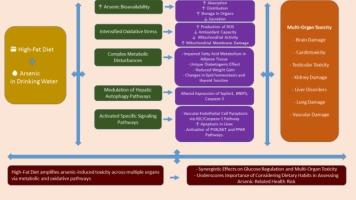高脂肪饮食会加重砷对各个器官的毒性。毒性和机制的系统综述
IF 2.9
Q2 TOXICOLOGY
引用次数: 0
摘要
背景饮用水中的砷污染仍然是一个主要的全球健康问题。最近的证据表明,饮食习惯,特别是高脂肪饮食,可能加剧砷引起的毒性。本系统综述研究了高脂肪饮食对不同器官砷毒性的影响,并探讨了这种相互作用的机制。方法在PubMed、Scopus、Web of Science、Embase等数据库中进行综合文献检索。涉及暴露于砷和高脂肪饮食的动物模型的研究也包括在这一分析中。使用sycle偏倚风险工具评估研究的方法学质量。结果共有20项研究符合纳入标准。研究发现,高脂肪饮食会增加砷的生物利用度,并加剧大脑、心脏、睾丸和肾脏等几个器官的氧化应激。同时暴露于砷和高脂肪饮食会导致复杂的代谢紊乱,包括脂肪组织中的脂肪酸代谢受损,以及一种独特的致糖尿病效应,其特征是葡萄糖耐受不良,但没有2型糖尿病的典型特征。有趣的是,尽管胰岛素抵抗和β细胞功能障碍增加,这种组合也导致体重增加减少。肝自噬途径的调节成为砷毒性与代谢失调联系的可能机制。本综述强调高脂肪饮食通过几种机制增强砷毒性,包括增加生物利用度、增加氧化损伤和改变代谢信号。葡萄糖调节和多器官毒性的协同效应强调了在评估砷相关健康风险时考虑饮食习惯的重要性。需要进一步的研究来阐明所涉及的分子机制,并设计有针对性的策略来减轻砷毒性,特别是在食用高脂肪饮食的人群中。本文章由计算机程序翻译,如有差异,请以英文原文为准。

A high-fat diet exacerbates arsenic toxicity in various organs. A systematic review of toxicity and mechanism
Background
Arsenic contamination in drinking water remains a primary global health concern. Recent evidence indicates that dietary habits, especially high-fat diets, may exacerbate arsenic-induced toxicity. This systematic review examines the impact of high-fat diets on arsenic toxicity across various organs and investigates the mechanisms underlying this interaction.
Methods
A comprehensive literature search was conducted in PubMed, Scopus, Web of Science, and Embase databases. Studies involving animal models exposed to both arsenic and high-fat diets were included in this analysis. The methodological quality of the studies was assessed using the SYRCLE risk of bias tool.
Results
A total of 20 studies met the inclusion criteria. High-fat diets were found to increase arsenic bioavailability and intensify oxidative stress in several organs, including the brain, heart, testes, and kidneys. Combined exposure to arsenic and high-fat diets resulted in complex metabolic disturbances, including impaired fatty acid metabolism in adipose tissue and a unique diabetogenic effect characterized by glucose intolerance without the typical features of type 2 diabetes. Interestingly, this combination also caused reduced weight gain despite increased insulin resistance and β-cell dysfunction. Modulation of hepatic autophagy pathways emerged as a possible mechanism linking arsenic toxicity to metabolic dysregulation.
Conclusions
This review highlights that high-fat diets amplify arsenic toxicity through several mechanisms, including increased bioavailability, elevated oxidative damage, and altered metabolic signaling. The synergistic effects on glucose regulation and multi-organ toxicity underscore the importance of considering dietary habits in assessing arsenic-related health risks. Further research is warranted to clarify the molecular mechanisms involved and to design targeted strategies for mitigating arsenic toxicity, particularly in populations consuming high-fat diets.
求助全文
通过发布文献求助,成功后即可免费获取论文全文。
去求助
来源期刊

Current Research in Toxicology
Environmental Science-Health, Toxicology and Mutagenesis
CiteScore
4.70
自引率
3.00%
发文量
33
审稿时长
82 days
 求助内容:
求助内容: 应助结果提醒方式:
应助结果提醒方式:


